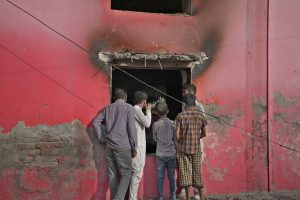Weeks after 21 churches and hundreds of houses belonging to the minority Christian community were burnt down in Pakistan’s Jaranwala area, Faisalabad police have unearthed the flimsy basis for the blasphemy accusation that led to the violence. Like so many incidents of rioting in the past, the Jaranwala tragedy seems to be based on personal enmity that was falsely given a communal color.
On August 16, just two days after Independence Day celebrations, a mob allegedly led by fundamentalist political group Tehreek-e-Labbaik unleashed its fury on the Christian settlements in the Jaranwala area of Faisalabad district of Punjab. The violence was denounced by political leadership and civil society alike. Caretaker Prime Minister Anwar ul Haq Kakkar condemned the incident and promised stern action against those who target minorities and violate the law.
As reported in the Urdu daily Jang, the police investigation suggests that the incident was caused by a mutual grudge between two individuals, both part of the local Christian community. The accused, Parvez Masih, suspected a man named Raja Amir of having an extra marital relationship with his wife. Masih had allegedly hired a contract killer to murder Amir. When that failed, Masih reportedly hatched a conspiracy to accuse Amir of desecrating the Quran.
Police had earlier arrested Amir and his brother on charges of desecrating the Quran and blasphemy in a case registered in Jaranwala on August 16. However, new facts uncovered by the police investigation painted a different story.
According to the latest police report, Masih forged insulting letters in the name of Amir and his brother. Parvez also tore pages of the Quran and threw them out in the streets in order to deliberately incite public fury.
In the mob violence that ensued, multiple churches and houses in the Christian settlements of Jaranwala region were attacked and set on fire.
The Minorities Alliance of Pakistan has rejected the findings of the police investigation and accused them of being biased. The chief of the alliance, Akmal Bhatti, said that police were deliberately trying to mislead people with false claims; not long ago, the police had tried to suggest that a foreign conspiracy caused the violence in Jaranwala. Bhatti said that the flawed approach of the police had caused the Christian community to lose all hope for justice to be delivered.
Whether the initial findings of the police investigation are believed or not, this incident once again highlights how blasphemy laws can be invoked and misused in Pakistan to settle scores in personal enmities. The Jaranwala case is peculiarly worrisome as both parties in the personal dispute, which eventually escalated to potentially fatal accusations of blasphemy, are from the minority Christian community.
Pakistan is labelled as the most fervent enforcer of blasphemy laws among the 71 countries that possess them. Earlier this year, a 22-year-old Christian named Noman Masih was sentenced to death by a local court in Bahawalpur for carrying blasphemous images in his mobile phone. Minority rights activists claimed that the investigation conducted in the issue had not been fair.
Similarly, another Christian woman named Musarrat Bibi was arrested in April for allegedly defiling the holy Quran. The case was eventually dismissed by courts as it was found out that the allegations were made by rivals who held grudges against Bibi for being awarded the management of a school canteen.
It is not uncommon to see false accusations of blasphemy levelled against religious minorities in Pakistan for personal vendettas, property disputes, religious prejudice, or business rivalries.
In Pakistan, acts of defilement of the Holy Quran are punishable by a term that can extend up to life imprisonment. This penal provision was introduced in 1982, one of many additions to the blasphemy laws between 1980 and 1984 introduced during the Zia ul Haq military regime.
Between 1987 and 2016, 1,472 people were charged under Pakistan’s blasphemy laws. Of those, 730 were Muslims, 501 were Ahmadiyya, 205 were Christians, and 26 were Hindus as per the Centre for Social Justice. Christians, who make up a little more than 1 percent of the total Pakistani population, have 13.9 percent of the blasphemy cases registered against them.

































